The Milky Way

Brief Synopsis
Cast & Crew
Leo Mccarey
Harold Lloyd
Adolphe Menjou
Verree Teasdale
Helen Mack
William Gargan
Film Details
Technical Specs

Synopsis
Sunflower Dairy milkman Burleigh Sullivan, a failure in his job, rescues his sister Mae from two drunken boxers one night in front of a nightclub. Using a technique he developed as a child, Burleigh ducks when Spider Schultz swings at him, and Speed McFarland, a middleweight champion who is standing behind Spider, is knocked out. The incident makes national headlines and infuriates Speed's manager, Gabby Sloan, because he believes Speed's reputation is ruined. While delivering milk one night, Burleigh's horse "Agnes" collapses, so he goes to a nearby apartment and uses Polly Pringle's phone to call for a veterinarian. The next day, Burleigh and Polly meet again at a barbershop and become better acquainted. That evening, Burleigh agrees to Gabby's proposal that he fight in a boxing ring in order to raise money to save Agnes, as he was fired from his job. Burleigh trains at Gabby's retreat, but the only person who is able to teach him is Ann Westley, Gabby's girl friend. Ann teaches Burleigh to move in the ring as though he were dancing a waltz. Burleigh wins his first fight, and every fight thereafter, and becomes a national sensation and extremely egotistical, unaware that all his fights are fixed. Wilbur Austin, the head of the Sunflower Dairy, buys Burleigh's contract from Gabby for $50,000 and matches him against Speed. Polly breaks up with Burleigh because of the change in his personality. When Burleigh's horse "Little Agnes," daughter of his first horse, accidentally knocks Speed out before the fight, Spider and Gabby attempt to revive him, but Spider inadvertently gives him a sleeping potion. Burleigh manages to win this fight honestly due to Speed's condition, which is fortunate as he bet all of Speed's money on himself. In the end, Burleigh wins back his girl and gets a partnership in the Sunflower Dairy.

Director

Leo Mccarey
Cast

Harold Lloyd
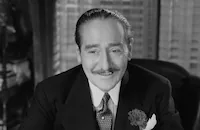
Adolphe Menjou
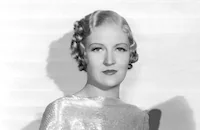
Verree Teasdale
Helen Mack
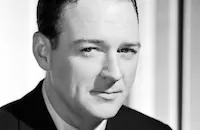
William Gargan

George Barbier

Dorothy Wilson

Lionel Stander

Charles Lane

Marjorie Gateson
Bull Anderson
Jim Marples
Larry Mcgrath
Bonita
Eddie Dunn
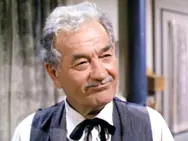
Milburn Stone
Paddy O'flynn
Henry Roquemore
Jack Clifford
Jack Perry
Phil Tead
Jack Murphy
Bob Callahan
Eddie Fetherston
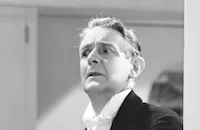
Leonard Carey
Antrim Short
Mel Ruick
Harry Bowen
James Farley
Harry Bernard
Morrie Cohan
Dan Toby
Sam Hayes
Marty Martyn
Eugene Berry
Charles Mcmurphy
A. S. "pop" Byron
Earl M. Pingree

Lloyd Ingraham
Oscar Smith
Hazel Laughton
Jay Belasco
Wally Howe
Murray Alper
Ethel May Halls

Gertrude Astor
Ray Cooper
Thomas Curran
Victor Potel
Crew
Travis Banton
Frank Butler
Harry Clork
Richard Connell
Hans Dreier
A. E. Freudeman
Alfred Gilks
Earl Hayman
Bernard Herzbrun
Grover Jones
Ray Mccarey
Norman Mcleod
Louis Mesenkop
Harry Scott
E. Lloyd Sheldon
Leroy Stone
Dink Templeton
Adolph Zukor

Videos
Movie Clip


Film Details
Technical Specs

Articles
The Milky Way
The expert supporting cast includes Verree Teasdale and Lionel Stander, who was so funny in the role of the champ's stooge and sparring partner that he repeated his role in a remake of The Milky Way called The Kid From Brooklyn (1946), starring Danny Kaye in Lloyd's former role. When producer Samuel Goldwyn bought the rights for the remake, he had the original negative and almost all existing prints of The Milky Way destroyed. Fortunately, Harold Lloyd carefully preserved his own original nitrate release print of the film. This print was the basis for the new digital video transfer which now airs on TCM.
Before Lloyd stepped in as star, The Milky Way had been planned as a vehicle for Jack Oakie, with Edward Everett Horton in Menjou's role. Helen Mack replaced Sally Blane, and Dorothy Wilson stepped in for an ailing Ida Lupino. Anthony Quinn appears as an uncredited extra in the film. When McCarey was hospitalized during production, Norman Z. McLeod directed some scenes. For a scene in which Buleigh was to ride a white horse and no such animal could be located, the movie's make-up artists were obliged to apply bleach to a horse of a darker color.
Producer: E. Lloyd Sheldon, Adolph Zukor
Director: Leo McCarey, Norman Z. McLeod
Screenplay: Grover Jones, Frank Butler, Richard Connell, from play by Lynn Root and Harry Clork
Cinematography: Alfred Gilks
Original Music: Tom Satterfield, Victor Young (both uncredited)
Non-original music: Charles Bradshaw, John Leipold, Ralph Rainger
Art Direction: Hans Dreier, Bernard Herzbrun
Editing: LeRoy Stone
Principal Cast: Harold Lloyd (Buleigh Sullivan), Adolphe Menjou (Gabby Sloan), Verree Teasdale (Ann Westley), Helen Mack (Mae Sullivan), William Gargan (Speed McFarland), George Barbier (Wilbur Austin), Dorothy Wilson (Polly Pringle), Lionel Stander (Spider Schultz).
BW-88m.
by Roger Fristoe

The Milky Way
Milky Way, The (1936) - Harold Lloyd's THE MILKY WAY on DVD
To order The Milky Way, go to TCM Shopping.
The Milky Way is one of the rare cases in which Lloyd starred in an existing project, not something he developed himself or which was developed expressly for him to star in. It's based on a 1934 play that briefly ran on Broadway, and it differs in two ways from what you might expect from a Lloyd comedy: it's very verbal and it features a colorful ensemble that shares the comic load with the star.
Despite the verbal repartee, The Milky Way is also a very physical comedy, especially during its stronger first half. That's when we meet Burleigh Sullivan (Lloyd), an underachieving Brooklyn milkman who gets into a scrape with two drunks while picking up his sister Mae (Helen Mack) after she's finished her shift at a restaurant. The drunks are hitting on her when Burleigh arrives and, after confounding them with nursery-rhyme-style putdowns when they keep asking him what his name is, Burleigh has the pair on the verge of a fight when Mae runs off for a policeman. Director Leo McCarey follows her as she turns a corner and finds a cop, while passersby hurry in the opposite direction, excited by the prospect of the developing scuffle. The camera follows Mae and the cop back to the sidewalk in front of the restaurant and the cop clears the mob away, to reveal one of the drunks KO'd on the sidewalk. He's Speed McFarland (William Gargan), the middleweight world champ, and the altercation ends up on the front page of the morning paper.
When the drunks clear the cobwebs from their heads the next morning, the second, Spider (Lionel Stander), the champ's sparring partner and bodyguard, is mortified. The champ's manager, Gabby Sloan (Adolphe Menjou), is bent out of shape. Speed wants revenge. And Gabby's tart-tongued mistress Ann (Verree Teasdale) wisecracks at every opportunity about these silly and, in the case of Speed and Spider, dumb men. Typical exchange: Ann (sarcastically mocking Spider's brainpower): "Good morning, Plato." Spider (dumbfounded): "Plate o' what?" With the press clamoring for reaction from Speed's camp, Burleigh pays a visit to their hotel to explain how it wasn't him who KO'd Speed, it was Spider. Burleigh is just a good ducker and Speed ended up taking the punch, he explains. Spider takes a poke at Burleigh, who ducks again, and down goes Speed again, just as reporters stampede into the room. The headline above the new photo: "This is Not Yesterday's Paper – It Happened Again Today."
These altercations and the attempts of Speed, Spider and Gabby to get him into a boxing ring are the highlights of The Milky Way. They even include some surprisingly good schtick involving Burleigh's beloved milk-wagon horse, Agnes. Spider and Ann continue to deliver snappy one-liners, like when the guys size up Burleigh and Spider jiggles the bottom of Burleigh's upper arm. Stander says, in his gravelly voice, "Soft as a bag of dead mice" (Stander played the same role in the 1946 Danny Kaye remake, The Kid from Brooklyn). Burleigh is eventually persuaded to begin a fighting career, but he doesn't know that Gabby arranges for his opponents to take dives so he can be built up for a title fight with Speed. The action moves to that inevitable showdown, with laughs coming from Burleigh's effort to have the "color" Gabby says the greats have and a scene in which Burleigh passes on his talent at ducking to a dowager (Marjorie Gateson). Burleigh's flamboyant "color" includes walking into a hotel with a lion in tow, something Preston Sturges essentially recycled a decade later when he and Lloyd collaborated on The Sin of Harold Diddlebock.
As always with Lloyd, much of the comedy comes from the discrepancy between his "normal guy" looks and the absurd situations. The staging of McCarey also gets the best out of the physical gags (he'd directed one of Laurel and Hardy's best shorts, Big Business, and the Marx Brothers' best movie, Duck Soup, before moving on to more conventional fare in the 1940s and 1950s). And the fast-talking cast helps to make The Milky Way a splendid souvenir from the screwball-comedy era. Reportedly, all prints of The Milky Way were to be destroyed after Goldwyn bought its rights for the Kaye remake, but fortunately a few survived. Although the movie slipped into the public domain over the years, the New Line version looks and sounds better than any of the cut-rate versions also available on tape or disc.
For more information about The Milky Way, visit New Line Cinema.
by Paul Sherman
Milky Way, The (1936) - Harold Lloyd's THE MILKY WAY on DVD To order The Milky Way, go to TCM Shopping.
Quotes
Trivia
When a suitable white horse for Burheigh could not be found, make-up artists were called upon to bleach a dark-colored horse blonde.
When director Leo McCarey was in hospital, Norman Z. McLeod directed some of the scenes.
Producer Samuel Goldwyn bought the rights for the property in the mid 1940s for his remake "The Kid from Brooklyn", as well as the original negative and almost all existing prints and destroyed them.
The movie was originaly planed as vehicle for 'Oakie, Jack' , Gertude Michael and Edward Everett Horton. When it was decided that it would be a Harold Lloyd starrer, Horton was replaced by Adolphe Menjou. Instead of Helen Mack, originally Sally Blane was cast. Due to illness, Ida Lupino was replaced by Dorothy Wilson.
Notes
According to "The Cutting Room" in Motion Picture Herald, the Dionne Quintuplets were expected to appear in the film. News items in Hollywood Reporter note that the screenplay was originally considered as a vehicle for Jack Oakie, with Gertrude Michael and Edward Everett Horton as co-stars, but when Harold Lloyd was cast in the lead role, Horton was considered too similar in style, and both he and Gertrude Michael were replaced. Horton was to be replaced by William Frawley. Other pre-release news items note that both Brian Donlevy, who played the part of "Speed" in the original play, and Max Baer were considered for leads as prizefighters. According to early scripts in the Paramount story files at AMPAS and news items in Hollywood Reporter and Daily Variety, Ida Lupino was replaced by Dorothy Wilson due to illness, Sally Blane was replaced by Helen Mack, and Gail Patrick was replaced by Verree Teasdale. Script files also mention the play The Cheese Champion by Leonard Scott and Harry Clork, which was the predecessor to The Milky Way; however, it is unclear if this is an early version of the play The Milky Way, or if it is an early version of the screenplay. A news item in Lib notes that production was interrupted by the illnesses of Adolphe Menjou, Verree Teasdale and director McCarey, who was hospitalized. Norman McLeod reportedly finished shooting the film in McCarey's place, however, a news item in Daily Variety notes that McCarey's brother, Ray McCarey, shot additional sequences as well. A news item in Daily Variety notes that because response to this film in other countries was exceptionally strong, future Harold Lloyd films would be produced "with foreign markets in mind." A modern source notes that Agnes was a dark horse bleached to look like a white horse.
The Milky Way was remade by the Samuel Goldwyn Studios in 1946 as The Kid From Brooklyn, starring Danny Kaye. Modern sources note that the negatives for The Milky Way were destroyed, and all copies pulled out of circulation by Goldwyn when they purchased the film from Paramount.














